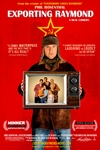- REVIEW
- READER REVIEWS
Exporting Raymond
|
(No longer in theaters)
|
|
Genre
Comedy, Documentary
Producer
Phil Rosenthal, Jim Czarnecki
Distributor
Samuel Goldwyn Films
Release Date
Apr 29, 2011
Release Notes
Limited
Official Website
Review
The newest auto-documentary, Exporting Raymond, is amusing and annoying in the wrong ratio, maybe 30/70. Directed by its protagonist, Phil Rosenthal, creator of the hit sitcom Everybody Loves Raymond, it has a fertile comic premise. Rosenthal is dispatched by Sony Pictures International to translate the series into Everybody Loves Kostya, for a Russian audience, with Russian collaborators, and he sets out to document the inevitable culture clash. Although campy shows like The Nanny and Married � With Children have done well in the Russian market, Raymond, says Rosenthal, is a more realistic, �relatable� series, inspired by his own Rockland County family and the life of his star, Ray Romano. So he’s taken aback when, in Moscow, the Russian costume designer thinks Kostya’s wife should wear �trendy� clothes even while doing housework, and the writers look blankly as he explains the humor of, say, a suitcase left out after a vacation that neither the husband nor the wife will put away�an obvious (and funny) metaphor for the couple’s daily power struggle.
Rosenthal is a tall, slightly manic Jewish male given to blurty, stammering one-liners in the Woody Allen mode. He gets laughs when he sardonically notes the wild dogs roaming outside the run-down studio or wonders aloud whether the dank rooms were used in the filming of Saw. He’s less likable when he tries to instruct the Russians in �relatable� comedy. He and Romano created a household of wishy-washy, often childlike men and dominating mothers and wives, and when told that the dynamic is different in Russian homes, he thinks they’re practicing self-deception. This is how it is everywhere, he says, and they just won’t admit it.
Rosenthal might be right in one respect: Given their history, Russians don’t vent like American Jews or Italians in a therapeutic culture. But he shows little curiosity about how differently their conflicts might be expressed in this newly capitalist society. He doesn’t consider the possibility that the flamboyantly fashionable costume designer might have insights into Russian housewives, who grew up wearing crap Soviet clothing and probably want to dress up more than their Long Island counterparts. Eventually, Rosenthal gets around to visiting a typical middle-class home and throwing back vodkas, but he spends most of his time searching for similarities instead of differences. He’s the sitcom creator as bubble boy.
I don’t mean to lambaste Rosenthal, who seems a decent man and created one of the more bearable sitcoms of recent years. But his sense of entitlement is all too scarily American. Like many critics, I had harsh words for Albert Brooks’s Looking for Comedy in the Muslim World, in which the comedian protagonist projects his own neuroses onto a foreign culture and flees in disgrace: Brooks was so self-hating that he forgot to give his alter ego any stature. But it’s no accident that Brooks has never done a TV sitcom; he lacks the requisite complacency. Maybe Brooks and Rosenthal could meet in the middle and make a great comedy of Americans abroad.
Related Stories
New York Magazine Reviews
- David Edelstein's Full Review (5/2/11)
